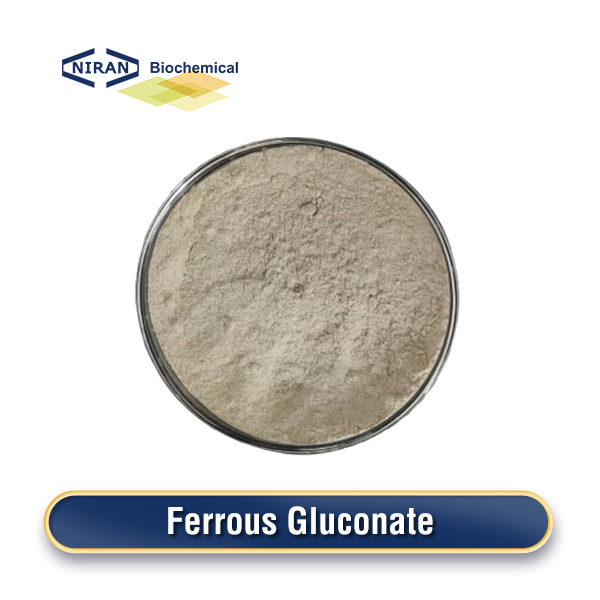Ferrous gluconate is a widely used iron supplement in medicine for treating or preventing iron deficiency anemia. Compared to other iron supplements, it is extremely accessible and mild on the digestive tract because it is a combination of iron and gluconic acid. Iron, as a critical mineral in the human body, plays a central role in various physiological processes, and ferrous gluconate is a practical solution to address iron deficiencies. This article explores its applications, benefits, and mechanisms, as well as common scenarios for its use.
Understanding Iron Deficiency and Its Impact
Iron deficiency arises when there isn’t enough iron to produce sufficient hemoglobin. Anemia, which is marked by symptoms including weakness, exhaustion, shortness of breath, and pale skin, can result from this illness.
Numerous factors can lead to iron deficiency, such as:
- A diet deficient in items high in iron, such as meat, fish, beans, and fortified cereals, is known as an inadequate dietary intake.
- Increased Iron Requirements: Situations like pregnancy or growth spurts in children.
- Blood Loss: Menstruation, gastrointestinal bleeding, or surgery.
- Malabsorption Disorders: Conditions like celiac disease or Crohn’s disease impair iron absorption.
Addressing iron deficiency is crucial for maintaining overall health, and ferrous gluconate offers a reliable means of supplementation.

How Ferrous Gluconate Works
Ferrous gluconate is an iron salt that releases elemental iron into the bloodstream upon ingestion. In the small intestine, it is mostly absorbed in the proximal jejunum and duodenum. The bioavailability of ferrous gluconate makes it an effective option for treating iron deficiency, as it ensures sufficient absorption without causing excessive gastrointestinal discomfort.
Transferrin proteins carry iron to different tissues once it has been absorbed. This stored iron is utilized to synthesize hemoglobin, replenish depleted iron stores, and support critical cellular functions.
Medical Applications of Ferrous Gluconate
1. Treatment of Iron Deficiency Anemia
Ferrous gluconate is most frequently used to treat iron deficient anemia. This disorder affects millions of individuals globally, particularly pregnant women, tiny children, and those with chronic illnesses. Ferrous gluconate is often prescribed due to its high absorption rate and reduced likelihood of causing gastrointestinal side effects compared to other forms of iron.
2. Supplementation During Pregnancy
The body needs far more iron during pregnancy in order to sustain both the growth of the fetus and the rise in the volume of the mother’s blood. Ferrous gluconate is recommended for pregnant women to prevent anemia and ensure healthy fetal growth. In order to lower the risk of low birth weight, developmental problems, and premature delivery, adequate iron levels throughout pregnancy are essential.
3. Handling Chronic Diseases
Chronic illnesses like chronic kidney disease (CKD), cancer, or heart failure can lead to anemia due to impaired iron metabolism or inflammation-induced inhibition of iron absorption. Ferrous gluconate serves as a supplemental therapy in such cases, improving hemoglobin levels and overall quality of life.
4. Post-Surgery Recovery
Patients recovering from surgeries, particularly those involving significant blood loss, may experience temporary iron deficiency. Ferrous gluconate supplementation helps rebuild iron stores and accelerates recovery.
5. Nutritional Support for Specific Populations
- Children and Adolescents: Growth spurts demand higher iron levels, and ferrous gluconate provides an effective solution for preventing deficiency.
- Elderly Individuals: Aging populations often face dietary insufficiencies or absorption challenges, making supplementation necessary.
- Vegetarians and vegans: Supplements may be required because plant-based diets may not include adequate bioavailable iron.

Ferrous Gluconate Advantages
1. High Absorption Rate
A bioavailable form of iron that is readily absorbed in the digestive system is ferrous gluconate. This reduces the likelihood of unabsorbed iron causing irritation or discomfort.
2. Gentle on the Stomach
Ferrous gluconate is less likely to cause common side effects such as nausea, constipation, or abdominal pain compared to other iron salts. Because of this, it is a suggested option for people with sensitive stomachs.
3. Effective for Long-Term Use
Ferrous gluconate is suitable for extended supplementation, as it maintains steady iron levels without significantly overwhelming the body’s regulatory mechanisms.
4. Widely Available and Affordable
Ferrous gluconate supplements are readily available over the counter and are cost-effective, making them accessible for most patients.
Administration & Dosage
The severity of iron deficiency, age, and health status of the individual all affect the ferrous gluconate dosage. Common guidelines include:
- Adults: 120-325 mg of ferrous gluconate daily, equivalent to approximately 35-65 mg of elemental iron.
- Pregnant Women: 30-60 mg of elemental iron daily, as recommended by healthcare providers.
- For children, the typical weight-based dosage is 2 to 3 milligrams of elemental iron per kilogram of body weight per day.
For best absorption, ferrous gluconate is usually consumed empty-handed. Though absorption may be somewhat decreased, it can be taken with food if stomach discomfort arises.
Possible Adverse Reactions and Things to Think About
Although ferrous gluconate is usually well tolerated, certain people may have negative side effects, like:
- Mild digestive issues such as diarrhea, constipation, or nausea.
- Darkening of stools, which is harmless but may be alarming to patients unaware of this effect.
To reduce side effects, patients should take their medications as directed and refrain from overdosing. Furthermore:
- Vitamin C Intake: Ferrous gluconate is better absorbed when consumed with foods or drinks high in vitamin C.
- Avoiding Calcium-Rich Foods: Avoid calcium around the time you take the supplement because it can affect how well iron is absorbed.
Comparisons with Other Iron Supplements
Ferrous gluconate is often compared to other iron salts, such as ferrous sulfate and ferrous fumarate. While ferrous sulfate is more commonly prescribed, ferrous gluconate’s lower likelihood of causing gastrointestinal issues makes it a preferred choice for sensitive patients. Additionally, ferrous fumarate offers a higher concentration of elemental iron but may increase the risk of side effects.
The patient’s unique needs, medical history, and tolerance all play a role in the supplement selection process.
Conclusion
Ferrous gluconate is a versatile and effective solution for addressing iron deficiency and preventing anemia. Its high bioavailability, tolerability, and accessibility make it a preferred choice for diverse populations, including pregnant women, children, and individuals with chronic conditions. By replenishing iron levels and supporting critical physiological functions, ferrous gluconate plays an essential role in maintaining overall health and well-being.
Whether used as a treatment for anemia, a preventive measure during pregnancy, or a nutritional aid for specific dietary needs, ferrous gluconate demonstrates its value as a reliable and efficient iron supplement. For individualized advice and dosage modifications to optimize the advantages of this vital mineral, always seek the advice of a healthcare professional.
